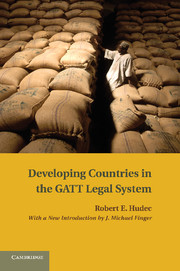Book contents
- Frontmatter
- Contents
- Foreword by Hugh Corbet
- Acknowledgments
- DEVELOPING COUNTRIES IN THE GATT LEGAL SYSTEM
- Introduction to the New Edition
- PART I A HISTORY OF THE LEGAL RELATIONSHIP
- PART II A LEGAL CRITIQUE OF THE GATT'S CURRENT POLICY
- 7 Basic Elements of the Legal Criticism
- 8 Separating Legal and Economic Issues
- 9 Impact of GATT Legal Policy on Internal Decision-making
- 10 Impact on Decisions in Other Governments: Non-reciprocity
- 11 Impact on Decisions in Other Governments: Preferences
- 12 First Steps Towards a Better Legal Policy
- List of References
- Index
10 - Impact on Decisions in Other Governments: Non-reciprocity
Published online by Cambridge University Press: 03 May 2011
- Frontmatter
- Contents
- Foreword by Hugh Corbet
- Acknowledgments
- DEVELOPING COUNTRIES IN THE GATT LEGAL SYSTEM
- Introduction to the New Edition
- PART I A HISTORY OF THE LEGAL RELATIONSHIP
- PART II A LEGAL CRITIQUE OF THE GATT'S CURRENT POLICY
- 7 Basic Elements of the Legal Criticism
- 8 Separating Legal and Economic Issues
- 9 Impact of GATT Legal Policy on Internal Decision-making
- 10 Impact on Decisions in Other Governments: Non-reciprocity
- 11 Impact on Decisions in Other Governments: Preferences
- 12 First Steps Towards a Better Legal Policy
- List of References
- Index
Summary
THE FOLLOWING two chapters examine the extent to which the GATT's current policy towards developing countries is likely to be effective in persuading the governments of developed countries to reduce trade barriers or otherwise improve the market access for the exports of developing countries. The present chapter considers the effectiveness of the non-reciprocal legal relationship sought by developing countries. The following chapter will consider the effectiveness of the commitment to obtaining preferential terms of market access.
One general caveat must be entered as to the analysis in both chapters. In principle, the legal policies being advocated by developing countries are meant to apply to all sectors of trade, agricultural as well as industrial. In practice, most of the debate about the effectiveness of those legal policies tends to focus on their effectiveness in lowering trade barriers in the industrial sector. It is usually taken for granted that trade barriers on the agricultural side are more deeply rooted and that more basic reforms may be needed before this or any other legal policy is going to have much chance of success. The analysis in the following two chapters is subject to the same reservation about trade in agricultural products.
BASIC POSITIONS REVIEWED
The debate over the effectiveness of the current non-reciprocal legal relationship between developed and developing countries is essentially a legal debate. All sides would agree that the objective -- reduction of trade barriers by developed countries -- is economically beneficial for developing countries.
- Type
- Chapter
- Information
- Developing Countries in the GATT Legal System , pp. 154 - 173Publisher: Cambridge University PressPrint publication year: 2010



